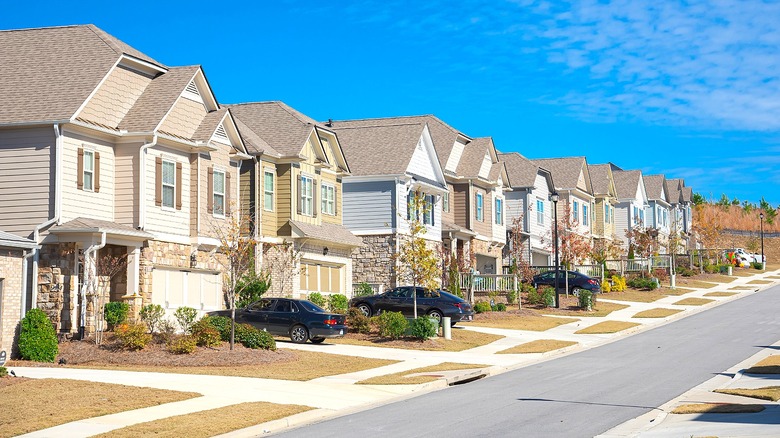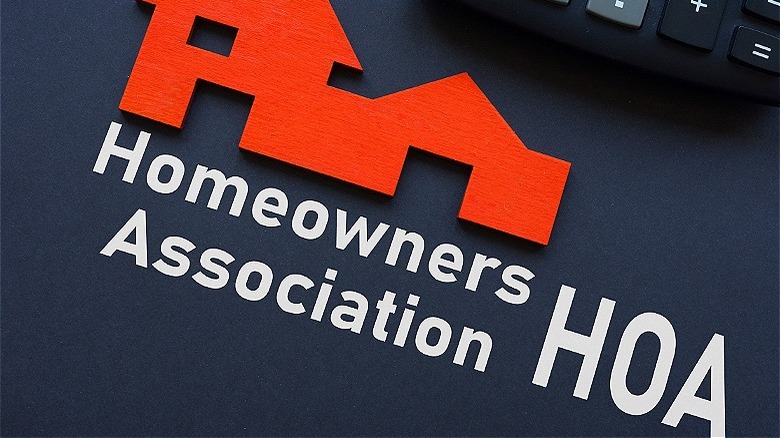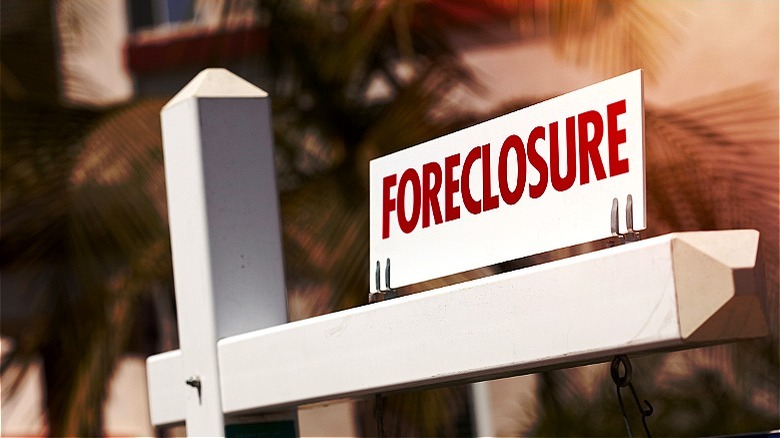What Actually Happens If You Don't Pay Your HOA Fees
Homeowners associations — or HOA for short — are promoted as a means to keep neighborhoods neat, safe, and maintained to a certain standard. Aside from regulating the upkeep and the appearance of properties in the community, HOAs may also be tasked with overseeing shared common spaces and amenities like fitness centers, security personnel, swimming pools, and landscaping.
The funds to support homeowners associations comes from the HOA fees collected from property owners within the community, typically on a monthly, quarterly, or yearly basis. HOA fees can vary widely based on region, as well as the exact scope of services provided. According to real estate firm Zillow, HOA fees typically fall in a range of $100 to $1,000 per month, with an average nationwide fee of $191 per month in 2021.
Besides the regular HOA dues, homeowners may also be required to pay a special assessment for repairs or improvements to common areas if the HOA doesn't have sufficient cash reserves to cover the expense. Finally, not complying with HOA rules, like parking violations or unruly landscaping, can result in fines in addition to the regular dues. So what happens if you're unwilling or unable to pay your HOA fees? Let's take a look.
At best, you'll waste money on penalties and interest
If you've only recently fallen behind on paying your HOA fees, then you'll most likely receive a reminder in the form of a letter from the association. Along with that menacing letter, it's probable that money-wasting interest or late fees will also begin to accrue, so it's best to resolve the problem quickly, if possible. If you've still not paid your overdue HOA obligations, the next step could be removing your access to common areas or amenities like a pool or gym.
While paying penalty fees or losing access to neighborhood amenities might be a nuisance, the homeowners association's next steps are far more threatening. If HOA fees are still delinquent for an extended period, the organization can send your account to a professional collections agency to recover the funds. If that happens, expect harassing phone calls and letters.
Even worse, the HOA can initiate a lawsuit against you for the past-due fees. If victorious in court, the assoication can win a judgment against you, which can include garnishing your wages in order to collect the judgment amount. Finally, not only will you have to pay back any HOA dues and fines, but it is also possible that you'll be required to pay the HOA's attorney's fees, which can amount to thousands of dollars.
You could face foreclosure
In a worst-case scenario, a lien that the HOA is allowed to place on your property could lead it to foreclose on your home in order to recover delinquent HOA fees. In reality, the odds of that scenario are low, but it definitely happens occasionally. Laws regarding HOA liens are complex and varied depending on what state you live in. In many states, the HOA's lien is in a second position to a first mortgage lien that your mortgage lender puts on the property, assuming you have a mortgage.
Therefore, if the HOA forecloses, the mortgage remains with the property and will need to be paid (or paid off) by the new owner of the property, or else the mortgage lender themselves can foreclose on the HOA or the new owner. This is to protect the first mortgage lender's considerable investment from getting wiped out in foreclosure by a comparably small amount of money to satisfy the debt owed to the HOA.
On the other hand, approximately 20 different states allow homeowners associations to file what's called "super-liens" once the amount owed to the HOA passes a certain threshold. These super-liens can take priority over other liens and loans on the property, including a first mortgage. Super-liens originated during the 2007 bursting of the real estate bubble, when many HOAs were getting short-changed on much-needed delinquent fees following foreclosure.
Fighting an HOA is a losing battle
According to the Foundation for Community Association Research, around 30% of all Americans live in planned communities, condominiums, or other types of dwellings governed by a homeowners association. If you're one of that 30%, it's wise to stay current on paying your HOA dues. At best, not doing so will result in unnecessary late fees and interest charges. At worst, you could find yourself facing considerable legal expenses, wage garnishment, and even losing your home to foreclosure. Needless to say, such actions could also have a negative effect on your credit score and your future ability to obtain loans and credit lines.
If you cannot afford the HOA dues, you feel they're excessively high, or your lifestyle results in a property that's not in compliance with HOA rules, a far better option is to move elsewhere rather than fighting with the homeowners association, which will surely be a losing endeavor. If you have not yet moved to a dwelling with an HOA, but are considering it, be sure to request and review a copy of the HOA's rules and regulations (aka CC&Rs; or, covenants, conditions, and restrictions) to make sure you're comfortable with what's expected of community residents, both financially and behaviorally.



